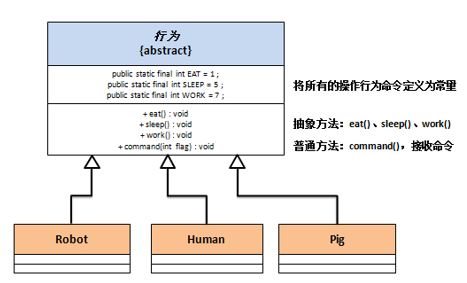Now suppose there are three kinds of reality (or more things):
Robot: it has two basic operations: charging and working;
Human: it has three basic operations: eating, working and sleeping;
Pig: it has two basic operations: eating and sleeping.

A behavior class defined by
abstract class Action { // Define an abstract behavior class. The behavior is not concrete
// When defining a constant, you must ensure that the result of adding two contents is not another behavior. For example, if the result of EAT + SLEEP is 6, it will not conflict with other values
public static final int EAT = 1; // Define the order to eat
public static final int SLEEP = 5; // Define sleep commands
public static final int WORK = 7; // Commands to define work
public void command(int flag) {
switch (flag) { // switch only supports numerical judgment, while if supports conditional judgment
case EAT: // Current operation for eating
this.eat();// Call the specific "eat" method in the subclass
break;
case SLEEP: // Operation currently sleeping
this.sleep(); // Call the specific sleep method in the subclass
break;
case WORK: // Actions currently working
this.work();// Call specific "work" methods in subclasses
break;
case EAT + WORK: // Behavior combination, this section is just an example, not a demonstration
this.eat(); // Call "eat" method
this.work();// Method to call work
break;
}
}
public abstract void eat(); // Define the operation standard of subclass
public abstract void sleep(); // Define the operation standard of subclass
public abstract void work(); // Define the operation standard of subclass
}
Define the behavior subclass of robot
class Robot extends Action { // Defining robot behavior
public void eat() { // Override action
System.out.println("Robot power up!");
}
public void sleep() { // This operation does not need to be overridden, so the method body is empty
}
public void work() { // Override action
System.out.println("Robots are working hard!");
}
}
Define human class
class Human extends Action { // Defining human behavior
public void eat() { // Override action
System.out.println("Humans are eating!");
}
public void sleep() { // Override action
System.out.println("Humans are sleeping and resting!");
}
public void work() { // Override action
System.out.println("People work hard for their dreams!");
}
}
Define pig class
class Pig extends Action {
public void eat() { // Override action
System.out.println("Pigs are eating trough!");
}
public void sleep() { // Override action
System.out.println("Pigs are sleeping and fattening up!");
}
public void work() { // This operation does not need to be overridden, so the method body is empty
}
}
Testing behavior
public class TestDemo {
public static void main(String args[]) {
fun(new Robot()); // Behavior subclass of transfer robot
fun(new Human()); // Transmission of human behavior subclass
fun(new Pig()); // Behavioral subclasses of transmitting pigs
}
/**
* Perform specific operation actions. Assume that the Department only performs three actions: EAT, SLEEP and WORK
* act Specific behavior object
*/
public static void fun(Action act) {
act.command(Action.EAT); // Call "eat" operation
act.command(Action.SLEEP); // Call "sleep" operation
act.command(Action.WORK); // Call work action
}
}
Program execution result:
Robot power up! (robot behavior)
Robots are working hard! (robot behavior)
Humans are eating! (human behavior)
Humans are sleeping and resting! (human behavior)
People work hard for their dreams! (human behavior)
Pigs are eating trough! (pig behavior)
Pigs are sleeping and fattening up! (pig behavior)